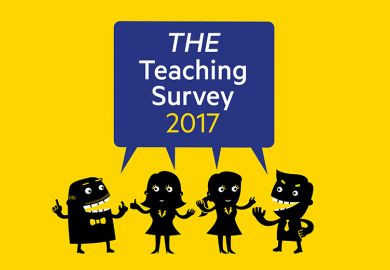When I bent over my home printer one day last year to check that it was switched on, its tiny digital screen told me that it was in “deep sleep”. And for a moment – honestly – I felt jealous.
Admittedly, my sleep had been particularly broken the night before. A bit of 3am dialogue with my daughter, who had woken up and come into bed with me, had left us both wide awake. After lying there beset by little pinpricks of white fear about how many things I had to do in the coming months, I had resorted to a meditation CD featuring the soothing Scottish accent of a man named Bodhipaksa. It worked like a charm – for my daughter, at least.
The irony is that one of the things I was worried about was a deadline associated with a research project on academic dissatisfaction. It is a small, qualitative study of academics who left, or are thinking of leaving, the profession “early”. In one or two cases, they felt that they could better use their talents elsewhere, but their reasons were mostly that they had been unable to secure stable ongoing work, or that the pressures and distresses of academic work had become unbearable.
The project, titled Weighing Up Futures: Experiences of Giving up an Academic Career, consists of 21 interviews and 13 written surveys. Participants, mostly from the UK and Australia, were selected semi-randomly from among the hundred or so people who contacted me in response to a single email sent to the mailing list of a higher education association, and one related tweet.
There is a saddening and powerful familiarity to their tales. A recurring contradiction is that people who truly and deeply loved academic work are much happier and healthier now that they are no longer doing it. Casual staff were demoralised by the precariousness, while tenured staff were disturbed by the increasingly corporatist ethos of the university and found the workload, as one participant puts it, “close to not-doable”. Another sums it up like this: “I genuinely have a life now that I would not have if I had taken the academic path. I have time for friends, for sport, for life!”
These findings should surprise no one who has been following the state of higher education. As early as 1996, a Guardian survey of UK academics found that one in five had thought daily about leaving academia. Twenty years later, Times Higher Education’s 2016 University Workplace Survey found that while 64 per cent of the 1,398 academics surveyed found their job “rewarding”, 39 per cent of them wanted to quit. Reasons included spending too much time working (68 per cent) and negative health impacts (51 per cent).
There appears to be something distinctive about academics’ experience of work-related stress. Numerous surveys of academics in the UK, Australia and Canada have found not only that stress has been on the rise for some decades, but also that its reported level now exceeds that in the general population. (The work of Vic Catano, professor of psychology at Saint Mary’s University in Halifax, Canada, is one place to find summaries of these studies.) The 1996 Guardian survey also found that academics were considerably more demoralised than individuals surveyed from 20 other occupational groups.
But is there really anything unique about the problems faced by academics? “Outsiders” suggest to me, with varying degrees of grace, that the precariousness of casual academics is shared by an increasing proportion of contemporary white-collar workers, and that laments about stress, overwork and time poverty are par for the course in all sorts of jobs.
There is much truth in this. According to Sarah Sharma, author of In the Meantime: Temporality and Cultural Politics, contemporary labour is underpinned by three “normal[ised] and mutually reinforcing conceptions of time”. These are that “(1) time management is the individual’s responsibility; (2) one must work harder to stay in time; and (3) being tired is a slow person’s excuse for being unproductive”. The point about individual responsibility is perhaps especially true of universities, where academics’ capacity to determine the work that they do and the way that it will be managed exceeds that of most professions. Should academics be pitied less for their difficulties in meeting deadlines when, unlike many other employees, they had some role in creating or accepting those deadlines?
Academics’ relative autonomy is also manifested in their ability to complain about their working conditions and to analyse them in public. This reflects the value placed by a wider society on academic labour, but, again, some might well argue that complaints from academics about time poverty are less morally urgent than complaints from other, less empowered workers about precariousness and economic poverty.
But regardless of such moral accounting, academic professional discontent matters because the university is an institution like no other. Its crucial role in producing and reproducing knowledge, educating and training people of all ages and serving society more generally means that the well-being and creative potential of its core workers should concern everyone.

Three characteristics of academic labour stand out as particularly distinctive: its boundlessness, its enmeshment with personal identity and its putative commitment to the social good. All these typify what has traditionally been called a vocation.
Almost all the study participants are happy to embrace this term and agree that leaving academia is different from leaving other professions. They cite the intensity of the work, its specialisation, the years of training required to secure even a foothold in the profession and the difficulty of “getting back in” after stepping out of it.
One of the conditions that makes demoralisation possible is, of course, the possession of high hopes and expectations in the first place – so it is, perversely, a marker of a certain kind of professional privilege. But vocational work is double-edged: it provides very real satisfactions and even long-term health benefits, but its sacrificial dimensions open it up to exploitation by others.
The intertwining of professional life with personal identity and a commitment to the social good is also common in teaching and nursing – and, sure enough, reports are common of widespread stress, demoralisation and values conflict in these professions, too, caused by the increasing demands and bureaucratisation that have accompanied the marketisation of the education and health sectors. According to a recent survey, up to half of all Australian teachers leave the classroom within five years. And in a 2016 study of Australian nurses and midwives, 32 per cent indicated that they had seriously considered quitting the profession. The study authors estimated a typical annual business turnover rate to be about 4 per cent.
I suspect, though, that sacrificial, grateful or vocational relationships to employment are slowly spreading beyond these professions – among employers, if not employees. This is due, in part, to a growing sense, promoted by the various happiness industries, that all aspects of our life, including work, should be creative and satisfying; this promotes a sense (naive or cynical) among bosses that everyone aspires to a collegial, satisfying workplace in which everyone gives a bit extra. But we should not underestimate, either, the extent to which the exercise of brute corporate power in deregulated labour markets can enforce a more sacrificial attitude.
Earlier this year, for instance, an illustrative incident in a branch of one of the two multinational chains that dominate the Australian supermarket landscape went viral. A trainee store manager sent an email to his 65 staff urging them to come in on a Sunday for four hours to clear a backlog of stock. “Plentiful” pizza would be on offer, but no extra pay. “I’m asking team members to give me 4hrs free labour,” he wrote – in the same week that considerable political turmoil erupted over a government attempt to reduce the enhanced rates the casual weekend workers receive.
While this incident appears to have been a one-off (the supermarket chain condemned it immediately), it may nevertheless point to new ways in which paid work is understood as something that employees should be grateful for and obedient to, and to which leisure and family responsibilities should play second fiddle. In other words, more and more people are obliged to treat their work as a vocation even if they would never think of it in those terms, and even if they receive none of the compensatory sense of meaning and fulfilment.
But if the corporate sector is picking up on the usefulness of the vocational ethos, the dynamic can also work in reverse. At least some academics now expect little more from their universities than other workers expect from their corporations. Many appear to feel that the care they display towards their students and colleagues is not returned to them by their managers. In the THE survey, more than 56 per cent of academic respondents disagreed with the statement: “My employer cares for the well-being of its staff.”
In terms of academic work specifically, the biggest question I am left with is an empirical one: just who is leaving the university early? The small scale of my project means that I was not trying to elicit statistical or generalisable data, so it was only by accident that I stumbled on an indication that something might be seriously wrong on the gender front.
Roughly 80 per cent of offers to participate in my project came from women. Some of the respondents took the gender issue as a given, one noting matter of factly that although women were well represented in her discipline, “we’re pushed out of academia so readily”. A UK participant said: “I think we’re going backwards on [academic staff] diversity.” Can this be true? The question urgently requires further investigation, as does the possibility that other demographic skews might also be in play when it comes to a propensity to quit the academy; quite a number of the interviewees mentioned in passing that they were the first in their family to go to university, for instance.
But the ultimate question that my research raises cannot be answered by empirical research alone. It is a conceptual and political one: what do we think universities are for – or should be for? How much credence you give the notion of a crisis in academic retention depends, in part, on how much you want to fight for the necessary distinctiveness of the university’s institutional form. And that, in turn, depends on whether you see universities primarily as communities of scholars, producers and repositories of knowledge, laboratories for solving big problems or as major contributors, directly and indirectly, to national economies.
For example, while the public may not feel much sympathy for the time poverty of people who are more able than most to work from home, they may care that a youthful researcher in cancer genetics – or law, or architecture, or early childhood education – decides that “the career I fell in love with no longer exists”, and drops out. Even someone with little sympathy for the human story behind that statement might wonder whether such an outcome is a reasonable return on national investment in human capital.
Of course, this is not only a picture of waste. Viewed positively, the exit of high-level expertise from the academy into a variety of other socially valuable sectors where it might not ordinarily have gone, such as school education, is a good thing. And even those who do not end up in such careers – an educationalist I interviewed had left to sell gelato; the cancer geneticist was seriously considering insurance – often find energising and productive ways of using their intellect outside the academy.
Still, most skilled and economically significant professions in which almost 40 per cent of workers want to leave would be viewed as being in crisis. Even if there are plenty of young would-be academics in the queue to replace them, universities’ relinquishment of specialists from virtually all fields of knowledge, often at the peak of their capacities, has to be seen as a threat to sustainable, long-term knowledge production.
The main THE feature a fortnight after the workplace survey was a “Workload survival guide for academics”. How about a serious attempt to manage the problem at its source – in the name of “business continuity”, or for the sake of the knowledge economy if the care of people and the expansion of knowledge is not motivation enough? In the absence of such an effort, we will also need a “brain drain survival guide for university managers”. Because there is a grave risk that rather than merely fighting for survival in the academy, more and more people will choose to thrive outside it.
Ruth Barcan is an associate professor in the department of gender and cultural studies at the University of Sydney.
POSTSCRIPT:
Print headline: Vocation, vexation, salvation
Register to continue
Why register?
- Registration is free and only takes a moment
- Once registered, you can read 3 articles a month
- Sign up for our newsletter
Subscribe
Or subscribe for unlimited access to:
- Unlimited access to news, views, insights & reviews
- Digital editions
- Digital access to THE’s university and college rankings analysis
Already registered or a current subscriber?








